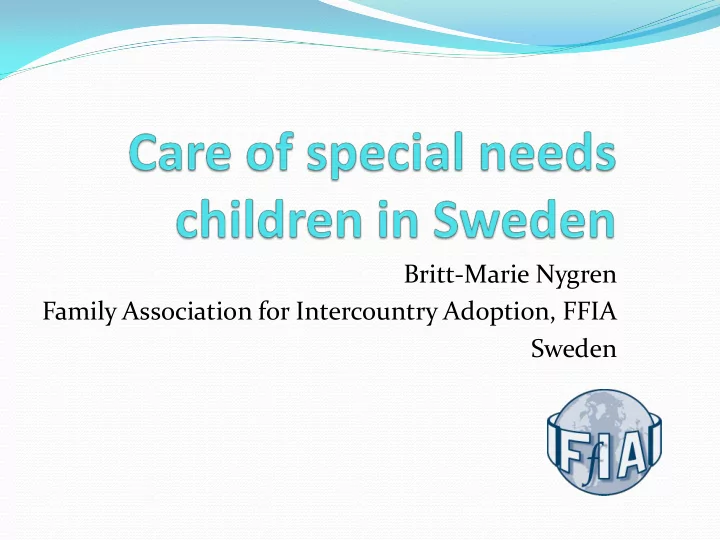

Britt-Marie Nygren Family Association for Intercountry Adoption, FFIA Sweden
A Family and a smile
The Swedish model Market economy Redistributive policy
Swedish society ground pillars Society with focus on safety and welfare of the individual Every citizen, regardless of background, income etc, should be guaranteed basic security in every phase of life High taxes pay for a large public sector and finance general welfare systems (healthcare, childcare, schools, senior care etc).
Equality A belief that everyone is of equal worth Discrimination prohibited • Sex • Ethnic origin • Physical, mental or intellectual disabilities • Sexual orientation • Political or religions conviction
Gender equality - Gender Gap Index = 81 % - 79% of women are employed (Europe = 56%) - 69 % of fathers (Europe = 33 %) take parental leave - Out of 480 days parental leave 60 days are reserved for each of the parents
Equal rights – disability policy People with disabilities have the same right to an independent life as everyone else. Focus has been shifted from social and welfare issues to democracy and human rights. Justice system Transportation IT
Social Insurance An integral part of Sweden´s welfare Covers essentially everyone For families, children and elderly People with disabilities, illnesses or occupational injuries
General benefits for parents ( child under the age of 10 years) Parental benefit to stay home 480 days Temporary parental benefit (Child birth or adoption) 10 days both parents (child up to the age 12 years) Temporary parental benefit for care of children and you have to stay home from work
Temporary parental benefit (Child under the age of 18 or 21) If the child is having certain functional impairments (special needs) (21 years) if your child is seriously ill with a great danger for the child´s life The child receives treatment for life threatening illness Valid for both parents / related to income
Health and medical care heavily subsidized, taxpayer-funded High cost protection for individuals Medical care, visit doctor, treatments etc max 160 USD / year - FREE CARD Medicines max 315 USD – FREE CARD Visiting doctor costs about 15 -30 USD / visit Care is free for children, max 14 USD/day for adults (law) + no extra payment for treatment and medicines in hospitals
Equal opportunities Community life Act concerning Support and Service for Persons with Certain Functional Impairments (LSS) Personal assistance free of charge
Childcare allowance (child 0-19 years) to provide parents with financial assistance Extra expenses and work The child needs special supervision and care Large additional expenses due to the disability or illness (adapt a home or move to another home, aids, special food, travel etc.)
Temporary parental benefit - contact days (for children with special needs to 16 years) To cover loss of income for the parents Purpose to learn more how they can support their child Parental training Visit pre-school or school Activity arranged by school
Arrival of SN child Immediately : Health control If the child has a known disability this is often prepared before the arrival Child health care unit, child clinic or school doctor later Referral to Habilitation centre
The County hospitals Child specialists Pre-contact for advice Pre-contact for plan of treatment Surgical procedures
Lip- and cleft palate The most common diagnose 6 specialist Centres Quality Control Network LKG association
Modern methods with good results Club foot Ponseti treatment
Child Habilitation Habilitate = ”To make skilled”, with goal to help the person living an independent life as a fully worthy citizen For persons with permanent disabilities Advise, support and treatment for children and their families Team of specialists in different areas
Habilitation , a ”+ resourse” in addition to ordinary health care Early contact for support From 6 years school with special groups for children with learning disabilities Strengthening the motor and linguistic development, the social interaction, testing aid equipment etc. Specialized teams for certain diagnoses
Rehabilitation and Habilitation in Sweden
Education every child shall have equal access
National Agency for Special Needs Education and Schools To ensure that children, young people and adults – regardless of functional ability – have adequate conditions to fulfill their educational goals. This is done through: special needs support education in special needs schools accessible teaching materials government funding
Special needs schools National resource centre Regional special needs schools Pupils with deafness or impaired hearing. National special needs schools Several different target groups. The teaching, environment and means of communication are adapted to the needs of the pupils.
The Child grows up… Disability allowance If you are 19 or over Assistance requirement and additional costs in daily life Costs for aids Health Care High cost protection
Disability movements strong tradition in Sweden Swedish Disability Federation 60 organizations receive state grants Organized based on their members 'disabilities Some focus specifically on children and families
Jens 24 years
Jens
Friday ´ s work Jens working with his teacher
To communicate and make friends is necessary for everybody!
Jens 32 years
Further information http://www.forsakringskassan.se Other languages http://www.spsm.se English http://www.ffia.se English
Recommend
More recommend